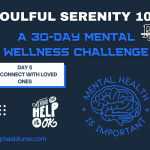Anxiety and low self-esteem are two common emotional challenges that many people face in their lives. These issues can have a profound impact on our overall well-being and quality of life. However, the good news is that they are not insurmountable. With the right strategies and mindset, it is possible to overcome anxiety and boost self-esteem.
In this inner confidence guide, we will explore the roots of anxiety and low self-esteem, the ways they are interconnected, and most importantly, practical strategies to conquer them and build a healthier sense of self.
Understanding Anxiety
Anxiety is a natural response to stress or danger. It is a feeling of apprehension, fear, or uneasiness about future events. While anxiety is a normal human emotion, it can become problematic when it becomes chronic or overwhelming, leading to an anxiety disorder.
Types of Anxiety Disorders
- Generalized Anxiety Disorder (GAD): GAD is characterized by excessive, uncontrollable worry about various aspects of life, often with no specific cause.
- Social Anxiety Disorder: This disorder involves an intense fear of social situations, where individuals may fear judgment, embarrassment, or humiliation in social interactions.
- Panic Disorder: Panic disorder leads to recurrent, unexpected panic attacks, accompanied by intense physical symptoms like heart palpitations, sweating, and shortness of breath.
- Specific Phobias: Specific phobias are intense fears of specific objects or situations, such as heights, spiders, or flying.
Causes of Anxiety
Anxiety can be caused by a combination of genetic, environmental, and psychological factors. Common triggers include:
- Stressful life events: Such as job loss, relationship problems, or the death of a loved one.
- Genetics: A family history of anxiety disorders can increase one’s risk.
- Brain chemistry: Imbalances in neurotransmitters like serotonin and norepinephrine can contribute to anxiety.
- Personality: People with certain personality traits, such as perfectionism or a tendency to be shy, may be more prone to anxiety.
- Trauma: Past traumatic experiences can lead to anxiety disorders.
The Interplay Between Anxiety and Self-Esteem
Low self-esteem can both contribute to and be exacerbated by anxiety. When you don’t feel good about yourself, it’s easier to doubt your abilities and worry about how others perceive you. This self-doubt can feed into anxiety, making it more difficult to face challenges and take risks.
Understanding Self-Esteem
Self-esteem refers to the value and respect you have for yourself. It’s about how you see yourself and the level of confidence you have in your abilities. Healthy self-esteem is crucial for overall mental well-being.
Signs of Low Self-Esteem
Low self-esteem can manifest in various ways, including:
- Negative self-talk: Constantly criticizing and belittling yourself.
- Seeking approval: Depending on others’ validation for your self-worth.
- Avoidance: Avoiding challenges or situations that require self-confidence.
- Perfectionism: Setting unattainable standards and feeling like a failure if you don’t meet them.
- Negative body image: Feeling dissatisfied with your appearance.
Causes of Low Self-Esteem
Several factors can contribute to low self-esteem:
- Negative childhood experiences: Bullying, neglect, or criticism during childhood can leave lasting scars on self-esteem.
- Negative self-perception: If you internalize negative feedback or constantly compare yourself to others, your self-esteem may suffer.
- Social and media influences: Comparing yourself to idealized images in the media can erode self-esteem.
- Unrealistic standards: Setting impossibly high standards for yourself can lead to constant disappointment.
The Connection Between Self-Esteem and Anxiety
Low self-esteem and anxiety often go hand in hand. When you don’t believe in yourself, you’re more likely to worry about failing or being judged by others. This can lead to avoidance of situations that trigger anxiety, reinforcing negative beliefs about yourself.
Strategies to Overcome Anxiety and Boost Self-Esteem
Navigating the path toward overcoming anxiety and elevating self-esteem requires a set of effective strategies. Let’s delve into a range of practical approaches, from professional guidance to daily practices, designed to empower you to take charge of your emotional well-being.
1. Seek Professional Help
If you’re struggling with severe anxiety or deeply entrenched low self-esteem, it’s essential to seek the guidance of a mental health professional. Therapists and counselors can provide evidence-based therapies such as Cognitive-Behavioral Therapy (CBT) or Dialectical Behavior Therapy (DBT) to address these issues effectively.
2. Challenge Negative Thinking Patterns
Both anxiety and low self-esteem are fueled by negative thought patterns. Start by identifying and challenging these thoughts. Ask yourself if they are based on evidence or if they are distorted beliefs. Replace negative thoughts with more realistic and positive ones.
3. Practice Self-Compassion
Self-compassion involves treating yourself with the same kindness and understanding that you would offer to a friend. Be gentle with yourself, especially during moments of anxiety or self-doubt. Remember that it’s okay to make mistakes; they are opportunities for growth.
4. Set Realistic Goals
Setting achievable goals can boost self-esteem and reduce anxiety. Break larger goals into smaller, manageable steps. Celebrate your successes along the way, no matter how small they may seem.
5. Face Your Fears Gradually
Exposure therapy is a common technique used to treat anxiety disorders. Gradually expose yourself to situations or activities that trigger anxiety, starting with less intimidating scenarios. Over time, your anxiety will decrease as you build confidence.
6. Develop a Support System
Share your struggles with trusted friends and family members. Having a support system can provide emotional reassurance and encouragement. Sometimes, talking about your fears and insecurities can help alleviate them.
7. Practice Mindfulness and Relaxation Techniques
Mindfulness meditation and relaxation exercises can help manage anxiety. These techniques can ground you in the present moment, reduce the physical symptoms of anxiety, and promote emotional well-being.
8. Exercise Regularly
Physical activity has numerous benefits for mental health. Exercise releases endorphins, which are natural mood lifters. It can also improve self-esteem by helping you feel more capable and in control of your body.
9. Limit Exposure to Negative Influences
If certain people, situations, or social media platforms consistently trigger negative self-talk or anxiety, consider limiting your exposure to them. Surround yourself with positivity and support whenever possible.
10. Keep a Journal
Writing down your thoughts and feelings can be therapeutic. It allows you to gain insight into your patterns of thinking and identify areas where you can make positive changes.
Building Lasting Self-Esteem
Let’s explore essential strategies and practices that will help you strengthen your self-esteem and foster a positive self-image.
1. Self-Acceptance
Start by accepting yourself for who you are, flaws and all. Remember that nobody is perfect, and imperfections are what make us unique and human.
2. Focus on Your Strengths
Identify your strengths and talents and nurture them. When you excel in areas that matter to you, it can significantly boost your self-esteem.
3. Develop Healthy Boundaries
Learn to say no when necessary and set boundaries that protect your emotional well-being. Respecting your boundaries sends a message that you value yourself.
4. Practice Self-Care
Prioritize self-care activities that nourish your body and mind. This can include hobbies, relaxation, exercise, and healthy eating.
5. Surround Yourself with Positive Influences
Spend time with people who uplift and support you. Healthy relationships can bolster your self-esteem.
6. Forgive Yourself
We all make mistakes. It’s essential to forgive yourself for past errors and let go of guilt or shame. Remember that you can learn from your mistakes and grow.
7. Set and Achieve Personal Goals
Setting and accomplishing goals can provide a sense of purpose and achievement, contributing to a higher self-esteem.
8. Celebrate Your Achievements
When you achieve something, no matter how small, take the time to celebrate it. Acknowledge your accomplishments and reward yourself for your efforts.
9. Seek Inspiration
Find role models or inspirational figures whose stories resonate with you. Their journeys can inspire you to overcome challenges and build self-esteem.
10. Embrace Self-Improvement
Continuously seek opportunities for personal growth and development. Learning new skills and acquiring knowledge can boost your self-esteem and overall confidence.
Conclusion
In conclusion, the path to overcoming anxiety and boosting self-esteem is a transformative journey. It requires dedication, self-compassion, and the willingness to embrace change. While the road may have its challenges, remember that progress, no matter how small, is a testament to your strength and resilience.
Seek professional help if needed, challenge negative thought patterns, and cultivate self-compassion. Gradually face your fears, build a support system, and practice mindfulness techniques. Building lasting self-esteem involves self-acceptance, recognizing your strengths, and setting healthy boundaries.
As you implement these strategies and foster a positive self-image, you will find yourself on a remarkable journey towards a life filled with inner confidence, resilience, and fulfillment. Your journey begins today, and the possibilities for growth and self-discovery are endless.




